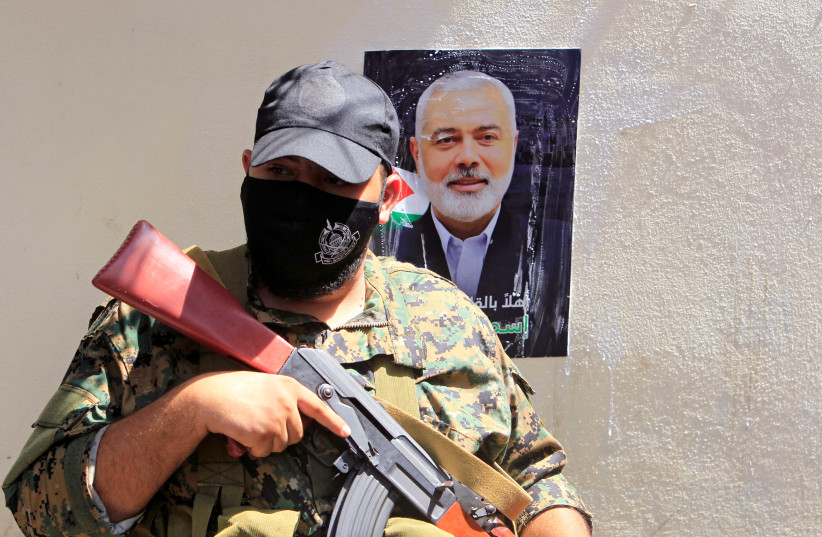A three-stage Egyptian initiative to stop the war in Gaza between Israel and Hamas was dead on arrival.
For more stories from The Media Line go to themedialine.org
This initiative proposes a phased approach to end the war, starting with a two-week, extendable truce and leading to a Palestinian national dialogue.
Egypt did not formally present the plan, and it was not officially rejected by either side.
However, both Hamas and Palestinian Islamic Jihad reportedly rejected the Egyptian proposal that would see Hamas give up control of the Gaza Strip in return for a permanent ceasefire with Israel.
A Hamas delegation led by Ismail Haniyeh, the group’s chief, arrived in Cairo last Wednesday to discuss the prisoners and other issues related to the Gaza Strip, including relief aid, reconstruction, and what sources described as “ending the division.”

However, they left without achieving any breakthrough, with Hamas leader Yahya Sinwar reportedly rejecting the plan.
Hamas is unwilling to engage in any prisoner exchange until Israel completely halts the war as it considers the presence of Israeli hostages in Gaza as an “important pressure card” on the Israeli government to end the war.
Izzat al-Rishq, a Hamas political bureau member, reiterated his group’s position that “there can be no negotiations without a complete stop to the aggression.”
Meanwhile, Israeli Prime Minister Benjamin Netanyahu made his position abundantly clear on Monday, repeating the Israeli assertion that Israeli forces will not stop fighting in the coastal enclave until it has toppled Hamas.
“We are not stopping. Anyone who talks about stopping — no, we’re not stopping. This war is going to go until the end. Until we finish them. No less than that.”
Speaking at a Knesset session on Monday, Netanyahu said Israel was making “every effort” to retrieve hostages being held by Hamas in Gaza, saying that doing so requires “military pressure” to succeed.
“We won’t stop fighting,” he said during the special parliamentary session, adding “we need time” even while hostages’ family members attending the session booed and shouted as he spoke.
“We aren’t stopping, and we won’t stop until victory because we have no other land and no other path,” Netanyahu said to boos from the hostages’ families.
Israel not interested in ceasefire
“Israel is not interested [in a ceasefire] because the decision is to continue with the war,” said Professor Efraim Inbar, president of the Jerusalem Institute for Strategy and Security.
Inbar told The Media Line that Egypt’s plan doesn’t address Israel’s main concerns. “It’s not a starting point because it will eventually leave some role for Hamas to play in the future, and that’s unacceptable for the Israeli government,” said Inbar.
Speaking on condition of anonymity, a senior Palestinian Authority official in Ramallah told The Media Line that talks about reaching a temporary truce are “hard” and “will require a lot of patience.”
“It’s definitely an ambitious plan, but it’s doable,” said the official.
Egypt proposed a “vision” rather than a concrete plan, which is also backed by Qatari mediators. It comprises three stages that would involve a humanitarian truce in exchange for the release of between 30 to 40 hostages. In return, Israel would release 120 Palestinian prisoners. During this truce, hostilities would cease, Israeli tanks would withdraw from the Gaza Strip, and food, medical aid, fuel, and cooking gas would flow into the enclave.
“I believe that the Egyptian brothers presented what they saw as objective, but the problem is that the Israeli wall, which is made up of stupidity, arrogance, wrong assessments, and a tendency toward murder, kills any initiative,” former Palestinian Minister Nabil Amr told The Media Line.
The proposal also includes a future permanent ceasefire and a leadership overhaul in Gaza, currently under Hamas.
Egypt suggested elections to initiate a Palestinian national dialogue under its sponsorship with the aim of “ending the division,” and forming a government of technocrats that will supervise humanitarian relief issues, the Gaza Strip reconstruction file, and paving the way for Palestinian general and presidential elections.
The deal proposes assurances to Hamas that its members would not face prosecution. However, the Islamist group rejected any concessions other than hostage releases, sources said.
More than 100 hostages are still believed to be held in Gaza.
“I believe what Egypt has presented deserves to be taken seriously, and that we work on developing it,” said Amr.
Amr claims that the Israeli premier is disinterested in negotiations that could end the war; rather, he only cares about his political interests. Therefore, said Amr, prolonging the war is in Netanyahu’s interest.
The third phase of Egypt's proposal will usher in a complete and comprehensive ceasefire and a significant prisoner exchange.
The final stage entails Israeli withdrawal from Gaza's cities, allowing the displaced to return home, including in the northern part of the Strip.
Netanyahu dispatched his confidant, Strategic Affairs Minister Ron Dermer, to Washington to discuss Gaza war's next phase.
“He’s Bibi’s man, and he’s in Washington to find out exactly what the mood in Washington is about the continuation of the war,” said Inbar, acknowledging that there exist differences in opinion between the US and Israel regarding the war.
“There are differences between the two allies, of course. First of all, regarding how to fight the war. The US wants Israel to use less firepower. Also, the debate about the day after.”
Continued Inbar: “I think Americans have much leverage and because of our dependence on US weapons, they are likely to use it as a pressure card,” he said.
However, Amr argued that Israel's policy “is not consistent or compatible with the White House's policy, so the problem is Israel.”
“What will affect Israel is internal pressure, the course of the war, and American pressure. The ability of external influence on Israel is almost non-existent, especially in light of the absolute American support, despite the isolation and diplomatic criticism it causes for America,” Amr concluded.
